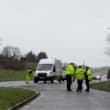Armagh Observatory is throwing its weight behind a campaign fronted by Queen guitarist Brian May to have more money invested in technology to identify asteroids which pose a risk to the future of our planet.
The Asteroid Awareness campaign declaration has been signed by more than 100 leading lights in music, government, astronomy and other fields.
The campaign wants to see a 100-fold investment in technology to identify and monitor those asteroids and comets which pose a threat.
As present, only in the region of 10,000 are known, but there are believed to be more than one million objects out there which, if an impact with Earth were to occur, would have devastating consequences. 
A concert – along the lines of Live Aid – is expected to be staged on June 30, 2015 – on Asteroid Awareness Day.
David Asher, of Armagh Observatory, is fully behind the campaign.
He told Armagh I: “I think it’s a great idea to be drawing attention to this cause.
“It’s not a matter of if an asteroid hits; it’s more a case of when.”
In February 2013, an asteroid struck in Russia injuring almost 1,500 people and damaging more than 7,000 buildings.
Mr Asher said: “The Russian asteroid a few years ago was an interesting reminder. We can keep an eye and track those really big asteroids – asteroids big enough to end civilization, but those are very less likely, say every half a million years, so the chances of one hitting us tomorrow is extremely small.
“However, the smaller ones [like that in Russia in 2013] we cannot track and don’t know when they will hit which is why more effort is needed to raise awareness.”
Others notable supporters include Astronomer Royal, Lord Martin Rees, and the former astronaut Ed Lu.
Asteroid Awareness Day will fall on the same date that, in 1908, an asteroid exploded, with the force of a hydrogen bomb, in Siberia.
While the public’s perception of such possibilities are acquired from Hollywood’s offering of movie blockbusters like Armageddon and Deep Impact, campaigners are highlighting that these dangers do exist – hence the need for more observation of asteroids and the threats which they present.
The dinosaurs became extinct after such an impact, and it has been put that, should an asteroid measuring anywhere between one and 10 kilometres collide with Earth, the dust cloud would be such that it would cause a global climactic catastrophe.
Larger than 10 kilometres and scientists and astronomers have warned that it could result in mass global extinction.
Dr Brian May, guitarist with rock band Queen, holds a PhD in Astronomy and is one of the leading faces in the Asteroid Awareness campaign.
As the plans were outlined earlier this month, he warned in a statement: “We are in more danger now than has been previously realised.
“In fact it might be said that we are on borrowed time, because, out of the million or so estimated potential impacting asteroids of sufficient size to cause major destruction on Earth, we are probably aware of only 10,000 – about one per cent.”
The former Liberal Democrat MP Lembit Opik is also a noted speaker on Near Earth Objects, and is supporting the campaign.
His grandfather, Ernst Opik, was one of the leading authorities on asteroids and spent much of his time whilst director of Armagh Observatory, a position he held up until 1981, researching the subject.





